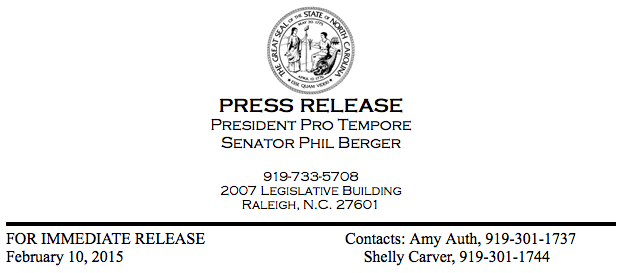Senate Republicans Craft Balanced Plan to Cut, Freeze Gas Tax
Proposal will stabilize highly volatile transportation funds, protect projects
Raleigh, N.C. – Senate Republicans have introduced a plan to cut and freeze North Carolina’s gas tax to 35 cents per gallon effective March 1. The proposal changes how the gas tax is calculated, providing much-needed funding stability to help protect critical transportation projects. The bill also provides a tax deduction for teachers who purchase classroom supplies out of their own pockets.
As a first step to stabilize and provide certainty for road funding, the proposal replaces biannual gas tax adjustments with a single, annual adjustment set on January 1. And while it provides a near-term gas tax cut, it also shores up transportation funding by freezing the gas tax at 35 cents through technical adjustments to the formula. Recent polling indicates voters support this approach.
“This balanced plan provides tax relief for all North Carolina drivers while helping ensure the state has the long-term resources necessary to build and maintain safe roadways, bridges and economic corridors,” said Senate Leader Phil Berger (R-Rockingham).
The gas tax is one of the state’s most volatile revenue streams. Presently, it makes up nearly 70 percent of the fund to maintain roads and bridges and approximately 60 percent of the state Department of Transportation’s budget.
The current system for calculating the gas tax has been in place for more than a quarter century – with lawmakers implementing only a few minor changes on occasion, like setting a temporary cap or floor.
The lack of certainty in the current formula makes it very difficult for the state to plan and fund road projects.
“Maintaining a strong transportation system is crucial to preserving a growing and productive economy,” said Senate Appropriations/Base Budget Committee Co-Chairman and Senate Transportation Committee Vice-Chairman Kathy Harrington (R-Gaston). “North Carolinians deserve roads and bridges that safely connect them to their jobs and families. And businesses need high quality infrastructure to move people and products and keep our economy thriving.”
North Carolina’s state-maintained transportation system is the second largest in the entire nation, after Texas. A number of other states place the burden of maintaining many roads on local governments, which often fund the expense through higher property tax rates. By contrast, North Carolina has some of the lowest property tax rates in the country.
“This proposal will make us even more competitive with our neighboring states – many of which are actively raising their gas taxes – while keeping scores of important transportation projects off the chopping block,” said Senate Finance Committee Co-Chairman and Transportation Committee Co-Chairman Bill Rabon (R-Brunswick.)
Background
The current system for calculating the gas tax requires biannual adjustments – on January 1 and July 1 of every year – based on the average wholesale price of gasoline during the prior six months.The intent was to smooth transportation funding by tying the gas tax rate to the market price of petroleum, the ingredient that accounts for most of the cost of making asphalt – which, up until the 21st century, was utilized in nearly all paving work statewide.
But since the state began tying gas taxes to wholesale fuel costs, two major changes have taken place:
- First, following a national trend, asphalt has faced increased competition from concrete, which doesn’t include petroleum.
- Second, the vast majority of asphalt now includes recycled material, which cuts down on the use of petroleum.
Paving costs have now stabilized, while petroleum costs remain highly volatile. The problem is further exacerbated because gas prices traditionally rise in the summer and fall in the winter.
The same system designed to prevent boom and bust cycles of road-building by tying the cost of asphalt to the gas tax is now creating boom and bust cycles.
###
by Sarah Curry
Director of Fiscal Policy Studies



